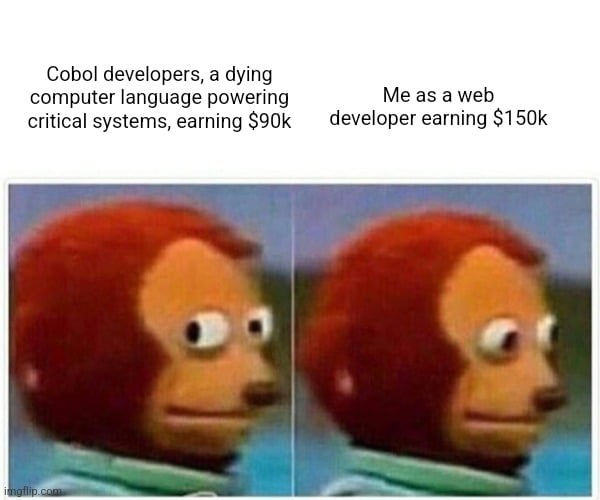799
you are viewing a single comment's thread
view the rest of the comments
view the rest of the comments
this post was submitted on 05 Dec 2023
799 points (95.0% liked)
Programmer Humor
19821 readers
723 users here now
Welcome to Programmer Humor!
This is a place where you can post jokes, memes, humor, etc. related to programming!
For sharing awful code theres also Programming Horror.
Rules
- Keep content in english
- No advertisements
- Posts must be related to programming or programmer topics
founded 2 years ago
MODERATORS

Cobol devs that we had (while we spent insane money to retire their systems) we're getting 300-500k/year.
I'm sure companies are trying to rip off any young new entrants but 90k seems super low.
Yep I know a COBOL programmer and she drives a nice-ass Mercedes SUV and owns 2 houses. Making way more than I do.
Better learn COBOL now.
Right, you can make that kind of money when you have 40 years of Cobol behind you. But even for new entrants, $90k seems low. There had better be a premium for dealing with old bullshit, especially when you're probably damaging your resume in the long run.
90k sounds pretty standard for inexperienced (although maybe not first job) devs in general for most markets. Throw in factors like experience or skills in low supply and that changes pretty fast.
I know that COBOL isn't going away anytime soon, but most companies have seen the writing on the wall for a long time. Anywhere that COBOL can be replaced with something more modern, it's already underway. Some places even have a surplus of COBOL devs because of it. But there are countless places where it can't be replaced, at least not reasonably.
The only way a COBOL dev is making $90k after 5 years is if there are very specific fringe benefits that make them not want to move along, or they are extremely naive about the market.
Rewrites are extremely risky though, and some companies don't want to risk it. That COBOL code probably has 40 years worth of bug fixes and patches for every possible edge/corner case. A rewrite essentially restarts everything from scratch.
Do you know of a decent sized company that successfully migrated away from COBOL? I'd be interested in reading a whitepaper about how they did it, if such a thing exists.